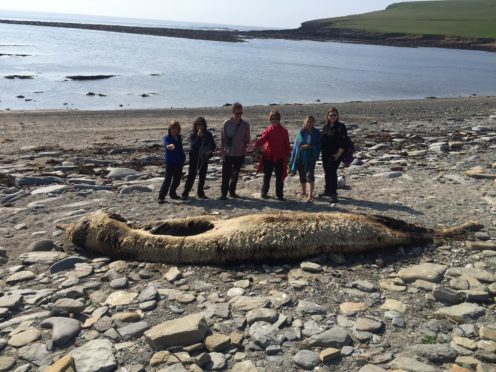When Catriona Macgregor brought her tour group to Orkney from America, it was to mainly to see puffins.
But they got more than they bargained for when they stumbled across the remains of a huge sea creature.
The 14ft long mammal has been lying in Marwick Bay for sometime, but scientist Ms Macgregor, who has a Masters in the Sciences, spotted it this week – and she was determined to find out what it was.
Catriona Macgregor, who discovered the mysterious creature on the shore, said: “I was leading a group to see the puffins and there it was right on the beach, which initially humorously we thought may have been the pictish beast.
“We were extremely surprised and quite amazed and perplexed because of the fact it had fur.”
Dr Macgregor set about finding out what the creature was, eventually concluding that mysterious looking creature in fact belongs to the cuvier species of the beaked whale family.
Coming from a scientific background, Ms Macgregor plans to analyse a sample of the fur-like substance found on the washed up whale.
Dr Macgregor said: “I’m going to put it under a microscope and I would be surprised if it wasn’t some sort of algae like organism, but if necessary we can run some DNA tests.”
Anna Bunney, education co-ordinator for marine protection charity ORCA, said: “The beaked whale family are quite elusive. They are deep divers and can hold their breath for a long time. The cuvier beaked whale is the species we see the most and they have been known to dive for two hours and 43 minutes to depths of 3,000 meters and can be found in European waters.
“As beaked whales are very elusive they tend not to spend so much time at the surface, coming up for air and then disappearing.
“Some species of the beaked whale have never been seen alive.
Dr Sam Collin of Scottish Wildlife Trust said: “Dead stranded whales can pose a threat to the public. This animal could be carrying diseases or infections so we would advise that people stay well back, avoid touching it, and leave it up to the relevant authorities to deal with.”
Anna Bunney added: “Whales and dolphins die out at sea due to natural causes and a variety of different threats such as pollution and ingesting plastics. Most of the time they will sink to the bottom of the sea, but occasionally due to storms and tidal changes whales and dolphins can wash up on land.”
